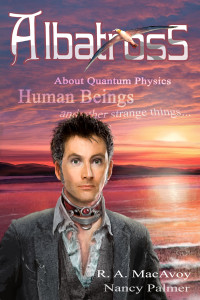
Temporarily unavailable. Being re-written and expanded galore!
Albatross is the first of the books I have done while learning to self-publish, as is the new norm. It is also my second collaboration, although the first time I’ve had the freedom to allow my collaborator to have her name up there with mine, Nancy Palmer. I feel the same energy as I did with the other, long-ago collaboration of BOOK OF KELLS.
My part in Albatross originated in a dream – an actual sleeping-type dream, not like Martin Luther King Jr.’s famous dream. It left my head filled with characters who would not be denied and would not leave me alone for a minute, waking or sleeping. I wrote the first (very rough) draft in four weeks. A copy I dared show to none but my closest friends took much longer. Then Nancy Palmer stepped in and sent the story in a new direction and made the whole thing work. So it feels different, as did KELLS.
The cover is modeled loosely after Nancy’s son, of all things, as some aspects of the protagonist were also modeled after him. But that’s Nancy’s story. Maurizio Manzieri did marvels.
Now that I think on it, my own idea for writing a book at this time came from friends on facebook urging me to write an updated version of TEA. And I guess it is that, in as much as it concerns two adult people coming together under odd circumstances, is only barely fantasy and is short, although not as short as TEA was. It also involves, music, personal peril and human affections. Even computers.
Other than that, however, it is like TEA as much as a fancy rocket that has fallen off its stand and is chasing the people who set it off is like the usual New Year’s display.

TEA TIME: or the quandaries of setting a book in the very near future
When we decided to write Albatross twenty five years in the future, it was with the idea that it would give us a little bit of wiggle-room. Since much of the book concerns the matter of Physics, and the often-titled Theory of Everything, or the Unity Theory, which will certainly rock human life, it seemed best to set the story in the future. After all, no one has yet presented a solid Theory of Everything. So how could we come up with one and have a novel work? Eh?
Wiggle room. So we thought.
This ingenious 25-year leap into the future turned from wiggle-room into a straight-jacket. It helped with the science, but not so much, as each of us kept coming up with new discoveries on the news that needed massive re-write. The Higg’s Boson companion (if it is what it seems to be). Gravitational waves.
And that was just the science!
Sweating, sweating, we began to consider all the other important changes in life which would go along with the advances in the sciences and which would touch the lives of the characters in the story even more than The Theory of Everything. In twenty-five years, we assumed, would people still be driving around in automobiles? Seemed likely – as this was not a Zombie Apocalypse novel. Petrol cars? Self-driving cars? Re-write. Rewrite.
Mobile phones. On the wrist, as part of one’s glasses? People still doggedly carrying things the size of card-decks in their pockets? Hey – at least a person in a self-driving car won’t be guilty of much as they babble or text into whatever form of phone they have as their cars zoom them to their destination. Or get lost in a daily traffic jam caused by the inevitable software problems.
And in a moment of O.C.D. we decided to eliminate all references to the daily habit of tea-time in the British Isles. It suddenly seemed too difficult to decide whether or not the increasingly technical lives we lead would have time for such an old custom. Eliminating all references to tea time was perhaps the silliest rewrite. But it explains, better than anything else, the straight-jacket effect of writing in the near-future.
This is only one aspect of the difficulty we found in writing twenty-five years into the future. There is politics, of course. Politics, metaphorical and real, were to be a large part of the plot of the book. But as the beach-sand of this election year slides away under our feet, there is no amount of rewrite that can make up for the changes. And had the novel been intended as strict mainstream, the present U.S. politics would have turned into both fantasy and science fiction without any action on our part.
In the end, the hardest part of all this rewrite – global changes in more than a word-processing sense – is that it made it so hard to wrest the theme of the book back into the hands of the human characters. Again and again. And a book about the near-future is a dead book. A living book is about people.
Ridley Scott probably had the best idea about writing into the near future. Throw it all out there, realistic or not. But Blade Runner had rough going for a generation, and its near future is now a distant, never-to-be achieved past.
The writers of Albatross are determined never to fall into the near-future trap again. Better “A Long Time Ago, In a Galaxy Far, Far Away.” Or perhaps that strange uncertain step sideways into another now entirely.
Leaving this comment as by ramacavoy, but it was written by the both of us. I haven’t figured out how to allow co-comments on my own site! -b